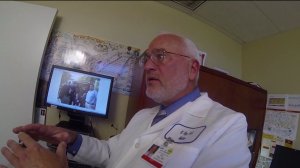MANTECA–
Local support for survivors of Typhoon Haiyan in the Philippines doesn’t always take the form of food or funds. Dr. Bill King, the Assistant Chief Physician at the Kaiser Permanente Medical Center, has his bags packed and ready to get a call from a Relief International to fly to the island nation.
King is one of 165 Kaiser staff volunteers who are willing to take non-paid time off to donate their services to typhoon victims. King has never been to the Philippines but knows what to expect there.
“Crowded conditions … unclean water, no sanitation, infectious diarrhea,” said King.
He’s already logged time at the New Orleans flood and the Haiti earthquake. He said the Haiti situation, in terms of medical aid, was in many ways much worse. King notes that the U.S. military presence in the Philippines means more medical supplies can be brought in more quickly.

King also said volunteers on two-week deployments are told what to expect — no fancy meals or beds. Think sleeping on the ground and in tents. And then there is the work schedule.
“You have to work six out of seven days; they are typically 10 hour days, 12 hour days, and when you’re off you’re preparing for the next day packing supplies and things like that,” said King.
King said the disaster site can exact a psychological toll. Kids and their mothers suffer the most. He also recounts the camp they set up in Haiti next to a school where seven or eight nuns died, buried in earthquake rubble.
“The building literally compressed on itself and they were in there the day we arrived,” said King. “It’s not just physical, it’s emotional.”
Medical volunteers no longer have to worry about treating broken bones, cuts or bruises, it’s now about treating and preventing infectious diseases caused by overcrowding and bad sanitation.
Kaiser doctors who couldn’t volunteer are still helping by supporting those who can go. Doctors who aren’t able to go have volunteered to cover the shifts and take care of the patients of doctors who are volunteering.
Despite the hardships, Dr. King can’t wait to get the call to deploy.
“It’s a labor of love … In the medical field, we all got in this business for this,” said King.
Relief International teams are setting up treatment camps now, using doctors who have ties to the Philippines and who speak the language. Others, like Dr. King, will be called in later for their two week deployments. Medical help, in terms of treating diseases related to overcrowding and bad sanitation, will go on for several months.





